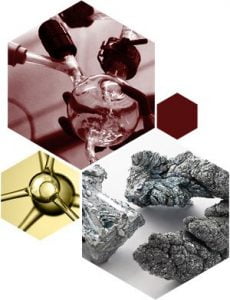
Sulfosuccinimidyl-4-(N-maleimidomethyl) cyclohexane-1-carboxylate
Properties
- We can offer items in bulk or custom. For other quantities or purities, please request a quotation.
- All prices are subject to change.
Information about Sulfosuccinimidyl-4-(N-maleimidomethyl) cyclohexane-1-carboxylate / CAS 92921-24-9
Sulfosuccinimidyl-4-(N-maleimidomethyl) cyclohexane-1-carboxylate (Sulfo-SMCC) is a water-soluble, heterobifunctional crosslinker widely used in biochemical and materials research. Featuring an N-hydroxysuccinimide (NHS) ester and a maleimide group, it enables selective conjugation between primary amines and sulfhydryl groups in biomolecules and synthetic polymers. In addition, its water solubility allows it to function in fully aqueous environments without the need for organic solvents, minimizing biomolecule denaturation and ensuring compatibility in various scientific applications.
Sulfo-SMCC is widely used for stable bioconjugation and scaffold engineering, ensuring long-term structural integrity in biomaterials. Its robust covalent bonding makes it ideal for applications where sustained molecular stability is required. Its NHS ester component reacts efficiently with primary amines to form stable amide bonds, while the maleimide group reacts selectively with sulfhydryl groups, creating highly stable thioether linkages. This feature makes it invaluable for immunoassays, where it is used to conjugate antibody fragments to enzyme markers, thereby enhancing assay sensitivity and specificity in detecting growth factors and disease biomarkers.
Sulfosuccinimidyl-4-(N-maleimidomethyl) cyclohexane-1-carboxylate is widely utilized in polymer science, particularly in sulfur-based polymer functionalization. It facilitates the modification of polymeric materials for applications in nanotechnology, separation science, and surface chemistry. Studies indicate that its ability to introduce Sulfur-containing functional groups is critical in designing polymer coatings with enhanced stability and reactivity.
Sulfo SMCC is also a valuable tool for hydrogel and acrylate composite functionalization, enabling precise surface modifications that enhance biointerface stability. It is particularly effective for optimizing the performance of PEG-based materials in biochemical and electrochemical applications. Such materials are essential for applications in energy storage, biosensors, and next-generation electrochemical devices.
In nucleic acid-based therapeutics, Sulfo-SMCC is employed to synthesize peptide-oligonucleotide conjugates (POCs). These conjugates serve as crucial tools in hybrid biomaterials and nanotechnology applications, supporting advancements in gene silencing and molecular diagnostics.
Additionally, Sulfo SMCC is used in affinity chromatography for the selective purification of biomolecules. By linking specific ligands to chromatography resins, it enables the isolation of target proteins with high efficiency, supporting advancements in analytical biochemistry and protein research.
- Hushida, S., et al. (1984) J. Applied Biochem. 56, 56-63.
- Staros, J.V. and Anjanejulu, P.S. (1989) Methods Enzymol. 172, 609.
- Zardán Gómez de la Torre, T., Herthnek, D., Ramachandraiah, H., Svedlindh, P., Nilsson, M., & Strømme, M. (2011). Evaluation of the Sulfo-Succinimidyl-4-(N-Maleimidomethyl) Cyclohexane-1-Carboxylate coupling chemistry for attachment of oligonucleotides to magnetic nanobeads. Journal of Nanoscience and Nanotechnology, 11(10), 8532-8537.
- Medina, R., Perdomo, D., Möller, C., & Bubis, J. (2020). Cross-linking of bovine rhodopsin with sulfosuccinimidyl 4-(N maleimidomethyl) cyclohexane-1-carboxylate affects its functionality. Biochemical Journal, 477(12), 2295-2312.
Safety
- H315 Causes skin irritation.
- H319 Causes serious eye irritation.
- H335 May cause respiratory irritation.
- P261 Avoid breathing dust/fume/gas/mist/vapours/spray.
- P280 Wear protective gloves/protective clothing/eye protection/face protection.
- P305+P351+P338 IF IN EYES: Rinse cautiously with water for several minutes. Remove contact lenses, if present and easy to do. Continue rinsing.
- P304+P340 IF INHALED: Remove victim to fresh air and Keep at rest in a position comfortable for breathing.
- P501 Dispose of contents/container to.....


